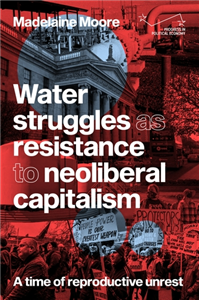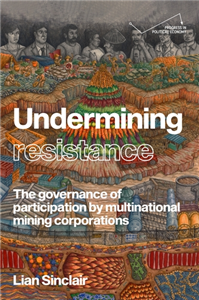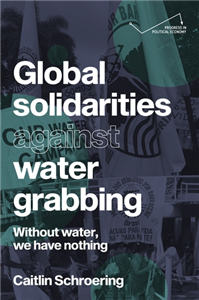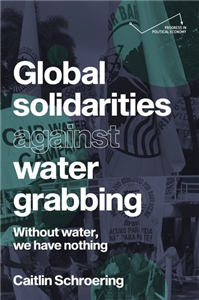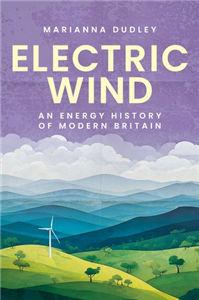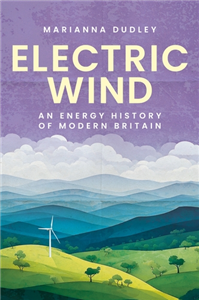Your Search Results
-
Promoted Content
-
Promoted ContentGeography & the EnvironmentMay 2019
Generation Weltuntergang
Warum wir schon mitten im Klimawandel stecken, wie schlimm es wird und was wir jetzt tun müssen
by Stefan Bonner, Anne Weiss
-
 Trusted Partner
Geography & the EnvironmentMay 2020
Trusted Partner
Geography & the EnvironmentMay 2020Toxic truths
Environmental justice and citizen science in a post-truth age
by Thom Davies, Alice Mah
-
 Trusted Partner
Geography & the EnvironmentMay 2020
Trusted Partner
Geography & the EnvironmentMay 2020Toxic truths
Environmental justice and citizen science in a post-truth age
by Thom Davies, Alice Mah
-
 Trusted Partner
Humanities & Social SciencesJune 2025
Trusted Partner
Humanities & Social SciencesJune 2025Living with water
Everyday encounters and liquid connections
by Charlotte Bates, Kate Moles
Living with water brings together sociologists, geographers, artists, writers and poets to explore the ways in which water binds, immerses and supports us. Drawing from international research on river crossings, boat dwelling, wild swimming, sea fishing, and drought impacts, and navigating urban waters, glacial lagoons, barrier reefs and disappearing tarns, the collection illuminates the ways that we live with and without water, and explores how we can think and write with water on land. Water offers a way of attending to emerging and enduring social and ecological concerns and making sense of them in lively and creative ways. By approaching Living with water from different disciplinary and methodological perspectives, and drawing on research from around the world, this collection opens up discussions that reinvigorate and renew previously landlocked debates. This book is relevant to United Nations Sustainable Development Goal 6, Clean water and sanitation
-
 Trusted Partner
Humanities & Social SciencesJanuary 2023
Trusted Partner
Humanities & Social SciencesJanuary 2023Living with water
Everyday encounters and liquid connections
by Kate Moles, Charlotte Bates
Living with water brings together sociologists, geographers, artists, writers and poets to explore the ways in which water binds, immerses and supports us. Drawing from international research on river crossings, boat dwelling, wild swimming, sea fishing, and draught impacts, and navigating urban waters, glacial lagoons, barrier reefs and disappearing tarns, the collection illuminates the ways that we live with and without water, and explores how we can think and write with water on land. Water offers a way of attending to emerging and enduring social and ecological concerns and making sense of them in lively and creative ways. By approaching Living with water from different disciplinary and methodological perspectives, and drawing on research from around the world, this collection opens up discussions that reinvigorate and renew previously landlocked debates.
-
 Trusted Partner
Humanities & Social SciencesJanuary 2023
Trusted Partner
Humanities & Social SciencesJanuary 2023Living with water
Everyday encounters and liquid connections
by Kate Moles, Charlotte Bates
Living with water brings together sociologists, geographers, artists, writers and poets to explore the ways in which water binds, immerses and supports us. Drawing from international research on river crossings, boat dwelling, wild swimming, sea fishing, and draught impacts, and navigating urban waters, glacial lagoons, barrier reefs and disappearing tarns, the collection illuminates the ways that we live with and without water, and explores how we can think and write with water on land. Water offers a way of attending to emerging and enduring social and ecological concerns and making sense of them in lively and creative ways. By approaching Living with water from different disciplinary and methodological perspectives, and drawing on research from around the world, this collection opens up discussions that reinvigorate and renew previously landlocked debates.
-
 Trusted Partner
Humanities & Social SciencesFebruary 2024
Trusted Partner
Humanities & Social SciencesFebruary 2024Political ecologies of the Far Right
by Irma Kinga Allen, Ståle Holgersen, Andreas Malm, Kristoffer Ekberg
This volume engages with the alarming convergence of far right thinking and the ecological crisis in contemporary society. Growing out of the first international conference on political ecologies of the far right, the volume gathers crucial insights from authorities in the field as well as promising early career researchers. With cases ranging from ethnographical accounts of fossil fuel populist protest, historical analysis of the evangelical support for fossil fuels to interrogations of the settler colonial identities and material conditions defended by far right actors around the world, the book provides scholars, students and activists with ways to understand and counter these developments.
-
 Trusted Partner
Humanities & Social SciencesFebruary 2024
Trusted Partner
Humanities & Social SciencesFebruary 2024Political ecologies of the Far Right
by Irma Kinga Allen, Ståle Holgersen, Andreas Malm, Kristoffer Ekberg
This volume engages with the alarming convergence of far right thinking and the ecological crisis in contemporary society. Growing out of the first international conference on political ecologies of the far right, the volume gathers crucial insights from authorities in the field as well as promising early career researchers. With cases ranging from ethnographical accounts of fossil fuel populist protest, historical analysis of the evangelical support for fossil fuels to interrogations of the settler colonial identities and material conditions defended by far right actors around the world, the book provides scholars, students and activists with ways to understand and counter these developments.
-
 Trusted Partner
Humanities & Social SciencesFebruary 2024
Trusted Partner
Humanities & Social SciencesFebruary 2024Political ecologies of the Far Right
by Irma Kinga Allen, Ståle Holgersen, Andreas Malm, Kristoffer Ekberg
-
 Trusted Partner
Humanities & Social SciencesJanuary 2023
Trusted Partner
Humanities & Social SciencesJanuary 2023Living with water
Everyday encounters and liquid connections
by Kate Moles, Charlotte Bates
Living with water brings together sociologists, geographers, artists, writers and poets to explore the ways in which water binds, immerses and supports us. Drawing from international research on river crossings, boat dwelling, wild swimming, sea fishing, and draught impacts, and navigating urban waters, glacial lagoons, barrier reefs and disappearing tarns, the collection illuminates the ways that we live with and without water, and explores how we can think and write with water on land. Water offers a way of attending to emerging and enduring social and ecological concerns and making sense of them in lively and creative ways. By approaching Living with water from different disciplinary and methodological perspectives, and drawing on research from around the world, this collection opens up discussions that reinvigorate and renew previously landlocked debates.
-
 Trusted Partner
Geography & the EnvironmentMay 2020
Trusted Partner
Geography & the EnvironmentMay 2020Toxic truths
Environmental justice and citizen science in a post-truth age
by Thom Davies, Alice Mah
In an age of post-truth politics, where official science is increasingly under attack, what is the role for grassroots citizen science in environmental justice campaigns? The environmental justice movement has traditionally rallied against the misuse of science, but it remains committed to 'science' itself. From e-waste extraction in urban Ghana to 'deeply participatory' citizen science in Southern France; and from toxic tours in Ecuador to air pollution activism in Antwerp, this book traces the complicated nexus of citizen science and environmental justice across a range of local, regional, and national scales. Together, these interdisciplinary contributions ask critical questions about how to overcome widening environmental inequality around the world, pushing the analytical boundaries of existing concepts and practices within the environmental justice movement. By examining the enduring salience of expertise in everyday life, Toxic Truths underscores the importance of environmental justice and citizen science within a post-truth era.
-
 Trusted Partner
Business, Economics & LawMarch 2023
Trusted Partner
Business, Economics & LawMarch 2023Water struggles as resistance to neoliberal capitalism
A time of reproductive unrest
by Madelaine Moore
This book provides an important intervention into social reproduction theory and the politics of water. Presenting an incorporated comparison, it analyses the conjuncture following the 2007 financial crisis through the lens of water expropriation and resistance. This brings into view the way that transnational capital has made use of and been facilitated by the strategic selectivities of both the Irish and the Australian state, as well as the particular class formations that emerged in resistance to such water grabs. What is revealed is a crisis-ridden system that is marked by increasing reproductive unrest - class understood through the lens of social reproduction theory. As an important analysis of two significant water struggles, the book makes a compelling argument for integrating the study of social movements within critical political economy.
-
 Trusted Partner
Business, Economics & LawJune 2026
Trusted Partner
Business, Economics & LawJune 2026Water struggles as resistance to neoliberal capitalism
A time of reproductive unrest
by Madelaine Moore
This book provides an important intervention into social reproduction theory and the politics of water. Presenting an incorporated comparison, it analyses the conjuncture following the 2007 financial crisis through the lens of water expropriation and resistance. This brings into view the way that transnational capital has made use of and been facilitated by the strategic selectivities of both the Irish and the Australian state, as well as the particular class formations that emerged in resistance to such water grabs. What is revealed is a crisis-ridden system that is marked by increasing reproductive unrest - class understood through the lens of social reproduction theory. As an important analysis of two significant water struggles, the book makes a compelling argument for integrating the study of social movements within critical political economy.
-
 Trusted Partner
Business, Economics & LawJanuary 2026
Trusted Partner
Business, Economics & LawJanuary 2026Undermining resistance
The governance of participation by multinational mining corporations
by Lian Sinclair
Why do multinational mining corporations use participation to undermine resistance? Do the struggles of local communities, activists and NGOs matter on a global scale? Why are there so many different global standards in mining? This book develops a new critical political economy approach to studying extractive accumulation, drawing on three detailed Indonesian cases to explain how participatory mechanisms continuously reshape and are reshaped by community-corporate conflict. Findings highlight feedback between local social relations, conflict, transnational activism, crises of legitimacy and global governance. The author argues that corporate social responsibility, community development, 'gender-mainstreaming' and environmental monitoring are neither simple outcomes of corporate ethics nor mere greenwashing strategies. Rather, participation is a mechanism to undermine resistance and create social relations amenable to extractive accumulation.
-
 Trusted Partner
Business, Economics & LawJuly 2024
Trusted Partner
Business, Economics & LawJuly 2024Undermining resistance
The governance of participation by multinational mining corporations
by Lian Sinclair
Why do multinational mining corporations use participation to undermine resistance? Do the struggles of local communities, activists and NGOs matter on a global scale? Why are there so many different global standards in mining? This book develops a new critical political economy approach to studying extractive accumulation, drawing on three detailed Indonesian cases to explain how participatory mechanisms continuously reshape and are reshaped by community-corporate conflict. Findings highlight feedback between local social relations, conflict, transnational activism, crises of legitimacy and global governance. The author argues that corporate social responsibility, community development, 'gender-mainstreaming' and environmental monitoring are neither simple outcomes of corporate ethics nor mere greenwashing strategies. Rather, participation is a mechanism to undermine resistance and create social relations amenable to extractive accumulation.
-
 Trusted Partner
Business, Economics & LawSeptember 2024
Trusted Partner
Business, Economics & LawSeptember 2024Global solidarities against water grabbing
Without water, we have nothing
by Caitlin Schroering
Conflicts over water are human-caused events with socio-political and economic causes. From the Movement of People Against Dams in Brazil to environmental activists in Pittsburgh, people are coming together to fight for control of their water. This book examines how movements are communicating and organizing against water privatization and other forms of water grabbing, and explores how movements engage with and learn from each other. Water is at the heart of this book, but Schroering's work is as much about collective struggle and popular organization as it is about water. Based on extensive fieldwork with two movements fighting against water privatization, the book uses anticolonial and feminist research methods to show how global communications and organizing are occurring around water and how Global North movements are engaging with and learning from the Global South and vice versa.
-
 Trusted Partner
Business, Economics & LawSeptember 2024
Trusted Partner
Business, Economics & LawSeptember 2024Global solidarities against water grabbing
Without water, we have nothing
by Caitlin Schroering
Conflicts over water are human-caused events with socio-political and economic causes. From the Movement of People Against Dams in Brazil to environmental activists in Pittsburgh, people are coming together to fight for control of their water. This book examines how movements are communicating and organizing against water privatization and other forms of water grabbing, and explores how movements engage with and learn from each other. Water is at the heart of this book, but Schroering's work is as much about collective struggle and popular organization as it is about water. Based on extensive fieldwork with two movements fighting against water privatization, the book uses anticolonial and feminist research methods to show how global communications and organizing are occurring around water and how Global North movements are engaging with and learning from the Global South and vice versa.
-
 Trusted Partner
Geography & the EnvironmentOctober 2025
Trusted Partner
Geography & the EnvironmentOctober 2025Electric wind
An energy history of modern Britain
by Marianna Dudley
A cutting-edge history of wind power in Britain. There are turbines on the horizon. The blades whirl with metronomic rhythm. With each rotation, wind is transformed into electricity. An energy revolution is underway. Electric wind rewinds to the beginning to explore the rise of wind energy in modern Britain. From the industrial revolution to the aftermath of war, through energy crisis and the changing politics of the late twentieth century, we see how energy has shaped a nation - and how a nation is reflected and refracted through energy. Boldly charting Britain through its wildest, windiest places, this book takes us to the edges of land and beyond to think deeply about the role of nature in politics, science and technology. Visionaries and hippies join engineers and entrepreneurs. Traditions and local cultures meet infrastructure and industry in this captivating history. At a time when action on carbon emissions is urgent, Electric wind offers examples, ideas and stories to fuel change going forwards. This book is an essential read for anyone interested in nature, climate change, landscape and the making of modern Britain.
-
 Trusted Partner
Geography & the EnvironmentOctober 2025
Trusted Partner
Geography & the EnvironmentOctober 2025Electric wind
An energy history of modern Britain
by Marianna Dudley
A cutting-edge history of wind power in Britain. There are turbines on the horizon. The blades whirl with metronomic rhythm. With each rotation, wind is transformed into electricity. An energy revolution is underway. Electric wind rewinds to the beginning to explore the rise of wind energy in modern Britain. From the industrial revolution to the aftermath of war, through energy crisis and the changing politics of the late twentieth century, we see how energy has shaped a nation - and how a nation is reflected and refracted through energy. Boldly charting Britain through its wildest, windiest places, this book takes us to the edges of land and beyond to think deeply about the role of nature in politics, science and technology. Visionaries and hippies join engineers and entrepreneurs. Traditions and local cultures meet infrastructure and industry in this captivating history. At a time when action on carbon emissions is urgent, Electric wind offers examples, ideas and stories to fuel change going forwards. This book is an essential read for anyone interested in nature, climate change, landscape and the making of modern Britain.















